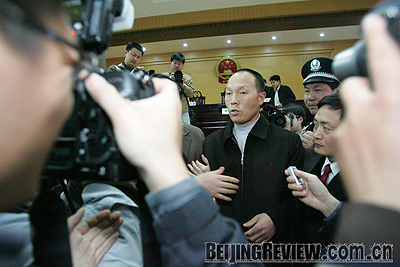|
|

WRONG JUDGMENT: She Xianglin, who was sent to prison for murder in 1994 but later found innocent after 11 years in prison, received only 460,000 yuan ($67,050) in state compensation
|
On October 23, the revised draft of the Law of the People's Republic of China on State Compensation finally came out after initial consideration by the standing committee of the National People's Congress. The draft drew attention, as it was the first time the law had been revised since being put into practice 14 years ago.
"The Law of State Compensation is a milestone in China's legal history," said Ma Huaide, Vice President of China University of Political Science and Law.
|
 |
TEARFUL VICTIM: Huang Jing, a college student who was wrongly sentenced to 10 months in prison for blackmail, was set free on November 27 last year and received 29,197.14 yuan ($4,257) in compensation |
However, in the eyes of many experts, implementation of the law has not met expectations. It is difficult to apply for state compensation and even after a successful application the amount of money received is likely to be small.
Common people
Sun Guihua, Deputy Attorney General of the Procuratorate of Harbin in northeast China's Heilongjiang Province, thought the low standard and narrow scope of the law prevent common people from using the judicial process to seek state compensation.
Liu Zhiyuan, Director of the Criminal Compensation Office of the Supreme People's Procuratorate, claimed that the law had difficulty assigning responsibility.
According to the current law, state compensation funds come from the Central Government, but the government bodies responsible for handing out the money are reluctant to do so because it could have a negative impact on their political careers.
The governmental bodies involved in crimes won't take the initiative to apply for compensation funds since it will have negative effects on their political achievements. No sooner do they get the compensation fund than the leaders of the government bodies are under investigation. Therefore, the governmental bodies always choose to hide it or settle it out of court.
In 2005, the 10th anniversary of the implementation of the State Compensation Law, a forum was held in Beijing. The voice of Ma, who said the State Compensation Law had failed over the past 10 years, was widely echoed.
Ma revealed statistics showing that from 1997 to 2007, the departments of public security, prosecution and court paid a total of 680 million yuan ($99 million) in state compensation, including 170 million yuan ($25 million) from the public security system, 150 million yuan ($22 million) from the prosecution system and another 360 million yuan ($52 million) from the court system. This number, according to Ma, is just a drop in the ocean compared to the huge amount of Central Government funds.
Ma also revealed that from January 1, 1995 to the end of 2004, the court system received 16,000 cases applying for state compensation, but only granted 5,442, just a third of the total.
|
